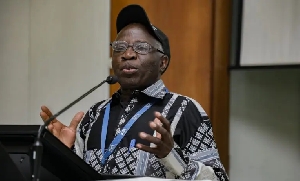Programme Coordinator of Technology for African Agricultural Transformation (TAAT), Chrysantus Akem, has said it is about time Africa consumes food commodities that are locally manufactured.
According to him, following this path will reduce the huge sum of money spent on importing foodstuffs, including rice and poultry.
Speaking at the launch of TAAT Phase II in Accra on Wednesday, March 20, 2024, Mr Akem noted that about US$35 billion is spent every year on food imports.
“Eat what you produce and produce what you eat because right now, it is estimated that we are spending about US$35 billion every year importing foods. This has to stop. We have to make sure that these amounts are diverted to other sections of the economy instead of importing food like rice that we can grow,” he said.
Citing Ghana as an example, Chrysantus Akem stated that the government could focus on soybeans, as oil can be extracted from this essential commodity for local use and exportation.
He further pointed out that the TAAT Phase II focuses on five commodities, including maize, soybeans, vegetables, and fish.
“Maize is a commodity we know is consumed across the country. The key thing we’re bringing is high-yielding varieties that can yield 5 to 6 tonnes per hectare compared to the 1 to 2 tonnes per hectare that the varieties yield. In addition, we also want to encourage the consumption of pro-vitamin A meals so that we can move from food security to nutrition security. That’s the first commodity,” the TAAT Coordinator stated.
He added, “The next one we’re bringing in is soybean. Ghana grows a lot of soybeans. We want to focus on soybeans to extract oil… The other commodity is vegetables. Vegetables are the new ones we are bringing in… and fish.”
The launch of Phase II of the Technology for African Agricultural Transformation programme gives researchers, policymakers, farmers, donor partners, and all stakeholders in the agricultural value chain the opportunity to move closer towards achieving greater agricultural productivity and food security in the sub-region.
The initiative aims to support countries in the region in improving crop, livestock, and fish productivity.
TAAT Phase II is expected to expand access to adaptive and proven technologies to more than 40 million smallholder farmers across Africa by 2025, as well as generate an additional 120 million tonnes of food.
Business News of Thursday, 21 March 2024
Source: www.ghanaweb.com













